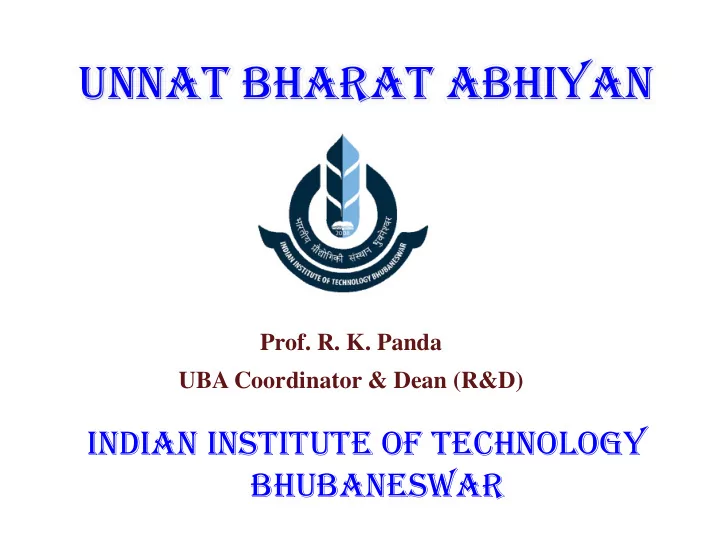

UNNAT BHARAT ABHIYAN Prof. R. K. Panda UBA Coordinator & Dean (R&D) INDIAN INSTITUTE OF TECHNOLOGY BHUBANESWAR
Adopted Villages under UBA Jorkul (Block: Banki, Dist: Cuttack, Odisha) 1. Argul (T ehsil: Jatni, Dist: Khurda, Odisha) 2. adjacent to the Institute Campus
Location of Jorkul Village Jorkul � Jorkul is a hamlet of Harirajpur village with 1081 households and a population of 4443 (with 1646 farm labourers)
On-going Activities in JorkulVillage � A sponsored research project entitled “Improving Groundwater Level and Quality through Enhanced Water Use Efficiency in Eastern Indian Agriculture” is being executed in the Jorkul village Funding Agency : Information Technology Research Academy (ITRA), • Ministry of IT, Government of India. � Baseline survey using household and village level questionnaire were carried out and the following problems are identified: Farmers of these villages are totally dependent on the rainfall; uncertainty and • variability of rainfall force them to sometime skip the Kharif rice Flood is also a big problem in the river Mahanadi; prolonged flood water • logging damages the standing crop and causes degradation in soil quality Declining ground water level and quality in the interest of rural community • Problems of cold storage and marketing of perishable products • Poor extension services • Marginal/fragmental land holding •
Understanding the problems Soil Moisture Sensors Test-bed for monitoring metrological and soil moisture dynamic in the Jorkul Village Collection of soil sample Training of farmers to use advanced technology
Possible Solutions � Formulation of management strategy for enhancement of agriculture water use efficiency through conjunctive use of surface and ground water resources � Use of innovative technology to address problems related to agricultural water management, recharge and other issues responsible for improper use of natural resources such as: Soil and Water � Reversal of declining ground water level and quality � Improvement of overall socio-economic condition of farmer/village using affordable low cost technology � Employment generation by setting up of low cost post-harvest processing units for processing of perishable products (e.g. tomato ketchup), low cost refrigeration and cold storage, packaging etc. � Training of farmers to use advanced technology
Location of Argul Villages Argul
Activities at Argul � Exhibiting the benefit of Solar power through installation of two solar street lights at the community centres � Awareness programmes among the School Children � Conducting household survey to collect the base line information � Meeting with the village community to know their problems
Solar Lights at Community Centres
Rural Drinking Water and Sanitation System Major Concerns � Inadequate or no infrastructure for providing safe drinking water and effective management of human wastes � Limited options for managing household water and human wastewater � Inadequate water, sanitation infrastructure, service delivery and unsafe behaviours are collectively responsible for water borne diseases, e.g., high diarrhoea incidence. � Poor economy and lack of knowledge is the major driving force behind non-availability of safe drinking water and poor sanitation system.
Rural Drinking Water and Sanitation System Contd.. Proposed Plan of Action � Need to emphasize more towards holistic and sustainable problem solving approach over technological innovations � Adoption of low cost but robust technology � Decentralized treatment technology with zero discharge concept � Exploration of natural treatment concepts for maintaining the stability of nature � Requirement of unskilled operation and maintenance � Simple but safe and highly effective treatment system � It must be mentally and spiritually acceptable by the community villagers
Low Cost Housing for Rural Areas � Low cost housing technology is needed for the rural areas without compromising safety and quality � It should also be earthquake resistant, cyclone resistant, fire resistant, thermally efficient, energy efficient and have environmental friendly credentials � The structures should have low weight superstructure requiring appropriate foundation to reduce the cost as well as earthquake related damage � Odisha has a large number of mineral based industries producing huge mass of wastes like slag, fly ash, red mud � The utilization of these industrial wastes in housing project will be beneficial in making the buildings more economical and sustainable
Rural Sanitation System � All domestic units must be connected with sanitary toilet and septic tank system for managing the black water � The effluent from septic tank and grey water from kitchen and bathroom should pass through a low cost filter system � This filter should be constructed with locally available materials with almost zero operational or maintenance cost � Frequency of cleaning should be once in six months, by replacing the top layer with locally available materials � The top soil after cleaning can safely be re-used as bio-organic fertilizers without any further treatment � Almost a perpetual type of toilet, septic tank, and filter system for rural sanitation practices
Solid Waste Management in Rural Area • Household level treatment of bio degradable waste • Composting • Vermi-composting • Biogas plant • Reuse of non biodegradable waste at the household level • Transportation of segregated waste at the household level to community collection centre by Self Help Groups (SHGs) • Waste which cannot be composted, reused or recycled may be disposed at the landfill sites following appropriate procedure • Non biodegradable waste to be further segregated and recycled • Recycle at village-level • To central recycling chain through scrap dealers
Recommend
More recommend